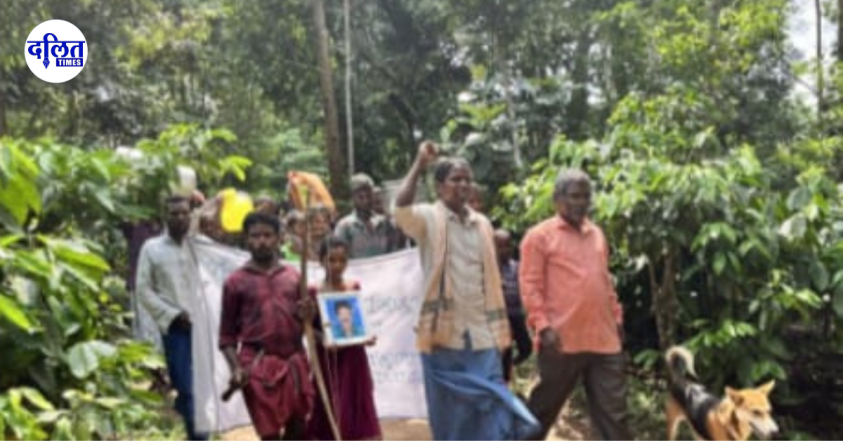Write By: Adv. Bindu Ammini | Dalit Feminist
On May 5, 2025, the forests of Karadikallu Hattur in Karnataka’s Chamarajanagar district bore witness not to the harmony of ecology but to the violence of state power. Fifty-two families of the Jenu Kuruba community—a Particularly Vulnerable Tribal Group (PVTG)—were forcibly evicted by the Forest Department from their traditional settlement in Kollehaadi village. What unfolded was not merely an act of displacement but a brutal betrayal of constitutional promise, legal safeguards, and ancestral belonging.
This was not an eviction. It was an erasure—of memory, identity, and rights.
A Community Betrayed
The Jenu Kurubas, traditional honey-gatherers and forest stewards, have lived in symbiotic relation with the forest for generations. Under the Scheduled Tribes and Other Traditional Forest Dwellers (Recognition of Forest Rights) Act, 2006—the Forest Rights Act (FRA)—they are entitled to individual and community forest rights, including habitat rights for PVTGs. These rights are not charity; they are legal guarantees rooted in the Indian Constitution’s promise of justice, equality, and self-governance.
Despite applying for forest rights as early as 2009, the Jenu Kuruba community’s claims were arbitrarily rejected—without proper hearings, evidence review, or due process. This is not bureaucratic oversight; it is institutional sabotage. The forest bureaucracy, still captive to colonial conservationism and Savarna eco-nationalism, continues to see Adivasis not as rightful custodians but as intruders in lands they have inhabited for centuries.
Also Read : Odisha Expands Reservation in Higher Education: A Step Toward Inclusive Policy Reform
FRA: A Law Betrayed by the State
The Forest Rights Act was enacted to redress historic injustices and return agency to Adivasi and forest-dwelling communities. Its provisions are unequivocal:
- Section 4(5): No member of a forest-dwelling Scheduled Tribe or other traditional forest dweller shall be evicted until recognition and verification of their rights is complete.
Yet the Forest Department violated this very clause. Bulldozers razed homes, women and elders fled into the wilderness, and children were left without shelter or access to basic amenities. No compensation. No relocation. No justice.
This is not just illegal—it is contempt of the law and a betrayal of constitutional morality.
Conservation or Corporate Capture?
India’s forests today are battlegrounds where two competing visions of land clash: one rooted in community stewardship, the other in exclusionary, elite-driven conservation. Under the guise of “scientific forestry,” “biodiversity protection,” or “climate action,” the state has normalized evictions in the name of protected areas, eco-sensitive zones, and afforestation drives.
These projects rarely displace resorts or mining companies. They displace forest dwellers—especially Particularly Vulnerable Tribal Groups, Dalits, and Adivasi women—whose mere presence challenges the state’s monopoly over the commons.
In Karnataka, this is not an isolated incident. In 2021, the Jenu Kurubas had already protested their displacement from Nagarhole Tiger Reserve. Carrying portraits of Birsa Munda and chanting “Jal, Jungle, Zameen,” they demanded what was theirs by right. Three years later, the response has been bulldozers, not justice.

Implementation Sabotaged, Justice Denied
Across India, the implementation of FRA has been dismal and deeply casteist:
- Over 50% of forest rights claims are rejected without proper scrutiny.
- Community forest rights—critical for collective autonomy—are ignored in favor of limited individual claims.
- Dalit and non-ST traditional forest dwellers face near-complete exclusion due to the ST-centric administrative lens.
- Forest departments routinely undermine Gram Sabhas, violating both FRA and the constitutional decentralization under the PESA Act.
- Women’s forest rights, especially in matrilineal or community-managed systems, remain invisible in claim processes.
The eviction at Karadikallu Hattur is a stark reflection of these systemic failures.
Caste, Capital, and the Crisis of Citizenship
Let us be clear: the attack on Jenu Kurubas is not only about forests—it is about caste, class, and control.
When corporations seek land for tourism or mining, the state obliges with speed. But when Adivasi communities assert rights granted by law, they are branded encroachers. The Compensatory Afforestation Fund Management and Planning Authority (CAMPA) Act and recent amendments to the Forest (Conservation) Act, 1980 now allow diversion of forest land without Gram Sabha consent. These are not neutral policy moves—they are legal tools to facilitate land grab from the most marginalized.
Evictions like these ask us to confront a difficult truth: citizenship in India remains graded. For many Adivasis and Dalits, it stops at the edge of the forest.
Resistance as Hope
Yet resistance endures.
From Mendha Lekha in Maharashtra to Koraput in Odisha, from the Bhoomi Adhikar Andolan to grassroots Adivasi women’s collectives, communities are reimagining justice through the Forest Rights Act. These movements are asserting not just legal claims, but a vision of democracy rooted in land, dignity, and ecological care.
The FRA is not merely a statute—it is a battlefield. It is a counter-narrative to capitalist extraction and caste violence. It affirms that forests are not empty lands waiting to be monetized—they are living, breathing archives of Adivasi existence and resilience.
A Call for Urgent Action
The eviction of the Jenu Kuruba families must be condemned by every democratic institution. The Karnataka government must:
- Immediately halt all evictions in FRA-eligible areas.
- Recognize and process pending claims, especially for PVTGs.
- Hold officials accountable for violating Section 4(5) of the FRA.
- Provide immediate relief, compensation, and rehabilitation for displaced families.
- Reaffirm the role of Gram Sabhas as sovereign decision-making bodies in forest governance.
If India is to uphold its constitutional promise, it must start by listening to its most dispossessed. The Jenu Kurubas are not asking for charity—they are demanding justice, dignity, and the right to live on the land of their ancestors.
“No more evictions. Implement the Forest Rights Act—fully, fairly, and fearlessly.”



